Earlier this term students were given the opportunity to immerse themselves in wildlife, conservation, and sustainability during our Pembrokeshire Study Tour. This six-day adventure was designed to enhance their academic and personal development through a series of engaging activities and workshops, all while gaining a deeper understanding of their social and environmental impact.
Joining the students on this learning experience were Kate Butler, the Student Experience and Outcomes Officer at University Centre Reaseheath and Lis Morris, Lecturer and Course Manager for Environment and Conservation Sciences.
Kate’s passion for adventure has taken her across Europe, Asia, Australia, and the Appalachian Trail in the USA. Here she shares her experience of an adventure a little bit closer to home.
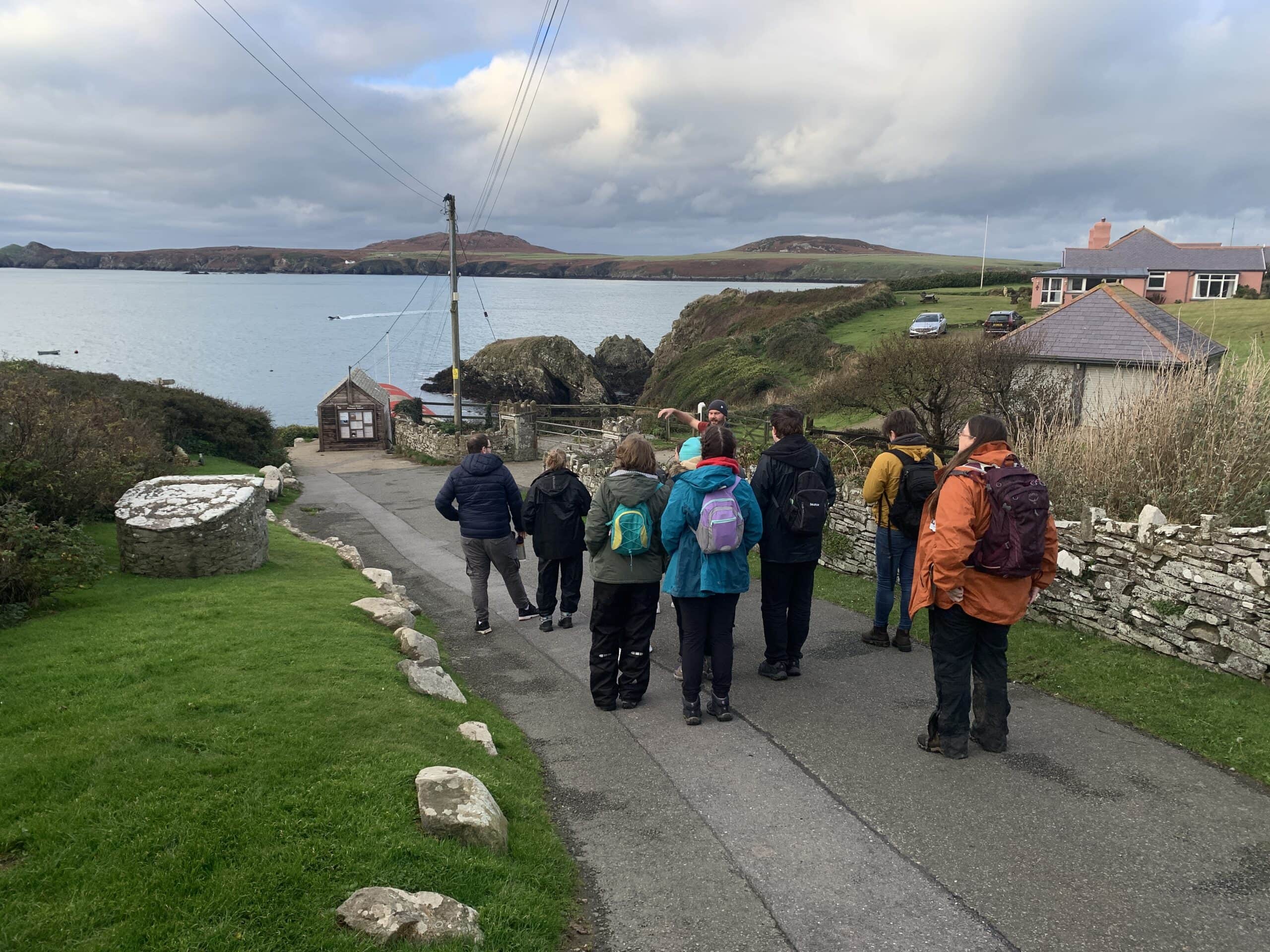
On this six-day adventure in South Wales, we were immersed in all-things wildlife, conservation and sustainability. Not only that, but the expedition helped us to work on our team building, communication and personal development skills, through various exciting activities. We also took part in several workshops to broaden our horizons and understand our social and environmental impact. It was a jam-packed week that won’t be forgotten, and you can read all about the experience below.
Day One
It was a cold, dark start on Sunday morning as we bundled sleepily into the minibus, nestling amongst mountains of bags, suitcases and equipment. We trundled down the country and over the Welsh border as the sun rose lazily into the sky, casting its first light over the quiet world still wrapped in slumber.
Before arriving at our accommodation, we dropped into The Bug Farm, where we were greeted by Rob Wilson, Flooglebinder’s Curriculum Exploration Officer, globe-trotting extraordinaire and our host for the week.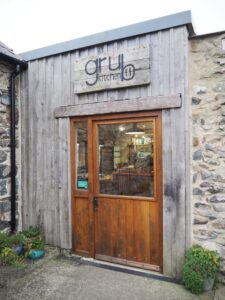
The Bug Farm is a unique destination situated on 100 acres of Pembrokeshire’s finest countryside. It offers visitors a chance to learn about the fascinating lives of insects, their habitats, and their essential role in our ecosystem.
We started our visit with a culinary adventure at the on-site café, Grub Kitchen, where we sampled a variety of dishes featuring edible insects. The taster session included bite-sized burgers, spicy pakoras, Bolognese and chocolate chip cookies, each dish showcasing creative ways to incorporate these sustainable protein sources into our everyday meals.
It was a surprising, yet delicious experience that challenged us to think differently about food and sustainability.
“I couldn’t tell that there were any bugs in the burger, it just tasted like a meat-free substitute, and you wouldn’t even know that they were in there” – Brad, Zoo Management.
After our meal, we explored the Bug Museum and Tropical Bug Zoo. They were filled with fascinating exhibits and featured mind-boggling facts about the different species, as well as beautiful displays, including a map of Great Britain shaped entirely out of bugs.
This gave us a new appreciation for these tiny creatures that often go unnoticed in our day-to-day lives. The impressively knowledgeable and passionate staff even gave us the chance to handle some of the more approachable species, including a Jungle Nymph, Madagascar Hissing Cockroach, Horse Head Grasshopper and Tailless Whip Scorpion.
We arrived at our accommodation, St Davids Bunk Barns, by late afternoon. We received a warm Welsh welcome from owner Rob – yes, another one, his wife Chris and their team. After a hearty jacket potato dinner, Lauren, a local yoga teacher came and turned the communal space into a peaceful studio, teaching us a beginner’s class under the fairy lights.
Day Two
Fog hung over the fields as we fuelled ourselves with a big, hearty breakfast before heading on foot into St Davids for an action-packed morning of coasteering with Tyf Adventure.
Donning our thick winter wetsuits, life jackets and helmets, we were driven to the small, working harbour of Abercastle, and soon found ourselves wading into the cold sea with our experienced and enthusiastic guides, Ben and Rich.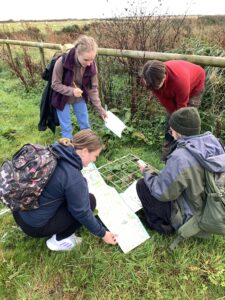
We bobbed along the coast, being gently pulled around by the swell, scrambled over slippery rocks blanketed with tiny, sharp barnacles, jumped into the sea from varying heights and dipped in and out of caves lined with sea sponges.
Harley, an Applied Zoology student, overcame his fear and jumped from the dizzying height of four metres into the deep swell below, twice!
“This was my first time coasteering. I have a fear of falling and jumping off the cliffs felt exciting and scary. I would definitely do it again!” – Harley, Applied Zoology.
In the afternoon, Rob took us onto the farmland surrounding the Bunk Barns to do some field work. We measured the biodiversity and examined the species richness of an area using quadrants, finding approximately twenty plant species in both the field and hedgerows.
We also set up a couple of camera traps, carefully positioning them on posts overlooking tracks left in the grass by several animals.
In the evening Rob set up a campfire and we huddled round roasting marshmallows and chatting about his amazing adventures across the globe with Flooglebinder.
Day Three
On Tuesday morning, we were whisked off for a boat tour around the windswept and ruggedly beautiful, Ramsey Island. The island is managed by the RSPB and is a Special Protection Area for Chough.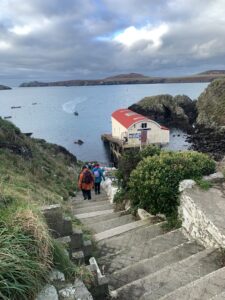
On our adventure, we witnessed porpoise gliding through the waters, grey seals lounging on shores, and an array of birds, including chough, herring gull, guillemot, and shag.
“We really enjoyed seeing the porpoises and going in the caves. The guides were so knowledgeable of the history of the island, and we loved going fast in the boat, especially around corners!” – Ali, Zoo Management and Cassie, Applied Zoology.
In the afternoon, Rob taught a fascinating sustainability workshop, talking about Flooglebinder’s mission and values, carbon offsetting, B corporations, and sustainable development goals (SDG).
The students were tasked with getting into groups and creating their own sustainable businesses, to be judged Dragons’ Den style on Friday.
In the evening, we enjoyed another yoga class, a talk about the importance of seaweed followed up with a taste of seaweed cake, and a cosy campfire to finish.
Day Four
After breakfast, Rob talked a little about plastic and its shocking impact on our environment. With that in mind, we head to Caerbwdy Beach to see just how much macro plastic we could collect.
The team collected all sorts, from discarded fishing nets, to bottle tops, a blanket, a deflated football and a rubber glove. We bagged it up and it was later revealed during sorting that we had collected 259 items!
At our second destination, Caerfai Beach, which we reached by hiking along the beautiful coastal path, we sieved the sand for microplastics, revealing tiny colourful pieces amongst the grains.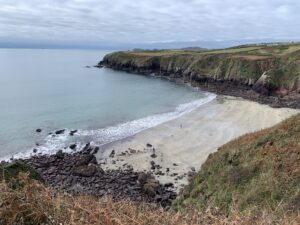
After lunch, the team head back to the coast for a spot of bird watching, spying shag, herring gulls, lesser and greater black back gulls, cormorants and oyster catchers.
Back at the Bunk Barns, every student acquired their drone Flyer ID, which means they can now legally fly drones anywhere within the UK and Europe.
After dinner, we walked into St Davids under the cover of darkness to do some bat detecting around the cathedral. At first, all was quiet, but as we moved about adjusting the frequency, the quiet night air came to life.
We identified barbastelle, common pipistrelle, serotine, noctule, lesser horseshoe and soprano pipistrelle bats, as well as a tawny owl hooting away in a nearby tree.
Day Five
The first job of the morning was to collect the camera traps we placed out on Monday afternoon. Back at the Bunk Barn, Rob played the results on the projector, revealing some amazing, intimate footage of badgers, foxes and a couple of rabbits.
Next, Lis gave the team a chance to learn about drones, looking at their features and how to use them safely, before heading outside and putting the theory learned yesterday to the test with a practical session.
“I really enjoyed flying the drone, I’ve never flown one before and liked being able to see the views from that height in the air” – Chris, Zoo Management.
Later, we made our way back to Caerfai Beach, where we met local forager and owner of The Really Wild Emporium in St Davids, John. 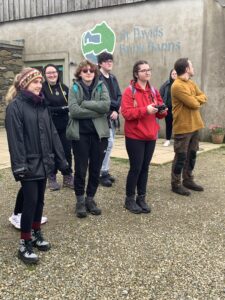
He brought his shaggy little dog, Seaweed, who was a big hit with the students, and took us around the beach showing us all the different kinds of seaweed, explaining their amazing benefits to our health and the planet. We even tasted a few varieties, including Pepper Dulce, also known as the truffle of the sea, thanks to its astonishing flavour.
In the afternoon the students had a couple of hours to relax, enjoy some down time and make their way into St Davids to explore the market. St Davids is known as Britain’s smallest city, thanks to its majestic 12th century cathedral, which is tucked away in a sheltered vale next to the river. It’s the birthplace of coasteering and a fantastic place to visit if you love the outdoors, wildlife and adventure.
Day Six
On our last morning, the students presented their sustainable businesses, talking about their missions, strategies, how they would impact the environment and align with SDGs. They were marked on their overall presentation, originality, teamwork and the feasibility of their businesses. Each team came up with some fantastic ideas and it was an exceptionally close call choosing our winners – the Fruity Elephant Bins!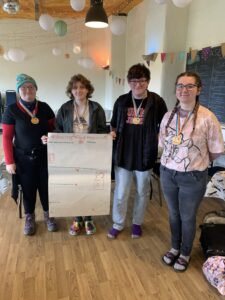
Fruity Elephant Bins
Reduce waste in zoos by encouraging staff and visitors to put their food scraps into specific bins designed for repurposing and reusing.
Reaseheath Roundabout
Make Reaseheath more sustainable by introducing a number of measures, such as canteen overflow meals, a community allotment and a clothing bank.
Ocean Cycle
Collect plastic from the ocean to repurpose into useful equipment for zoos, such as food containers and enrichment toys.
Before hitting the road, Rob asked everyone to reflect on their time spent in Pembrokeshire. We focused on two questions, and judging by the answers, we all really stretched ourselves, got out of our comfort zones, made some new friends and rediscovered our love of nature.
What have you overcome on this trip?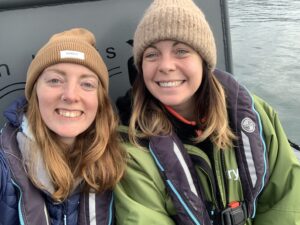
What will you take away from this trip?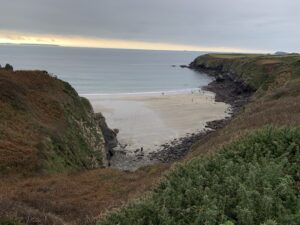
Visit our blog listings page or view our latest blogs below.
Canine Behaviour
Animal Behaviour